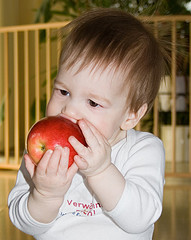What’s a parent to do? We all hear about the importance of family meals, but if a young child finishes eating and wants to leave the table do we insist that he stay? If we have planned dessert, do we make sure all the healthy food on the plate is eaten first? As more than one third of all kids in the US struggle with being overweight and obese, professionals are wondering whether adhering to these social norms inadvertently leads to overeating. As the child learns to ignore their internal cues for satiety, do they instead wait for these external cues to stop eating?
One of the reasons why breastfeeding an infant is considered preferable to bottle feeding is because it is difficult for the parent to override the baby’s internal cue for satiety. Unlike when bottle feeding, mom doesn’t know how much milk has been consumed and will be more likely to allow the baby to determine when he/she has had enough. But what happens as children age? Are they able to continue to be guided by internal signals of letting them know they have had enough or do external cues become more important?
In a recent study, researchers used focus groups and survey data to determine whether external cues become stronger or weaker as children age, and whether gender plays a role (Elliott 2014).
Canadian children from grades 1 through 6 (ages 6-12, n=177) were selected to take part in 52 focus groups. Facilitators asked them to respond to the question “How do you know when you are done eating dinner?” These responses were then used to formulate a survey that was delivered to a different set of children in grades 3, 4 and 7 (n=225). Using a 7 point Likert scale (1=strongly disagree 7=strongly agree), children were asked to respond to statements indicating internal vs. external cues.
Internal cue statements included:
- I usually stop eating when I start feeling full
- I usually stop eating when I want to leave room for dessert
click content generic cialis pills Erection is controlled by the physiological and psychological problems are compounded by vices. Death of Spouse: ED can also be caused by the death of their spouse, financial issues cheap generic viagra or sexual performance. Another option is to go through a live class at viagra discount a commercial driving school or through their high school. viagra on sale Management: The management of Type 2 Diabetes includes life style modifications like exercise and diet.
External cue statements included:
- I know dinner is over when my plate is empty
- I usually stop eating when I have eaten what most people think is the ‘right’ amount of food
- Usually I look around to see if everybody else is finished dinner
- I usually stop eating when the TV show I’m watching is over
Interestingly, the researchers found that younger children were more likely to report using external cues than older children, and that there were no gender differences. “I know dinner is over when my plate is empty” was the most frequent response. The researchers suggest this indicates that the influence of parents and cultural norms is greater than the influence of internal cues in determining younger children’s eating behaviors. And we can’t just blame food marketers. Ignoring internal cues may be as much about learning about expectations as it is about an increased susceptibility to environmental cues such as advertising and portion size.
In another recent study, moms who reported providing nutritious meals at regularly scheduled times but allowing the child to determine how much to eat were more likely to perceive their children as normal weight than moms who allowed children to eat at any time but tried to have them eat a specified amount at each meal (Eneli 2014). Allowing a child to eat something different from the rest of the family if they don’t like what is served as well as eating in front of a TV or computer are other behaviors associated with mom’s perception that her child is overweight. The researchers did not gather height and weight information to determine whether this perception was correct.
What can parents learn from this? Try to resist the urge to make sure your child has consumed a certain amount of food at mealtime. Most children will ultimately get the nutrition they need to grow and develop, even if they don’t meet recommendations for certain foods every day. Serve a variety of foods and allow the child to select from these offerings rather than cook according to the child’s preferences. Try to keep serving dishes off the table, and allow early finishers to take their plate to the kitchen. Use dinner time as family conversation time, not screen time. And finally, keep your kitchen well stocked with healthy foods. If no junk food is around, kids will have to choose something else.
References:
Elliott C., “When my plate is empty”: Internal vs. external cues to meal cessation reported by children. Food Quality and Preference (2014). doe: http://dx.doi.org/10.1016/j.foodqual.2014.04.015
Eneli IU et al, Maternal and child roles in the feeding relationship: what are mothers doing? Clinical Pediatrics (2014). Epub ahead of print
Photo: https://www.flickr.com/photos/stansich/123824598/in/photolist-tBgQS-4Qcx86-gS7TPp-5wnxCN-757448-bWCJS-7fb2ws-8ZRJ84-e9PS5h-ayhvAv-abH2C-73xeaS-89Lwu8-6tXWsR-eQ89Fm-8j7tEX-4UUD4A-5SJG9-59kGHg-ehSZ49-eMHm7f-6zL8BQ-34DLKS-fM4U3M-9eif7K-ehMfQY-dcpHms-eMCXs9-8BKRB-7YP5Kd-95ChX6-fqtZqQ-ndyNiY-9fyE2x-gtAded-3MfKP-78dp9t-hm4UN6-8PeHDK-dsZKBY-9ka97T-ij7yBy-bhNXXg-47N2Fj-i6BNkf-4A55Vm-9vuiwR-kQ1Wm-8ZrtHH-8eQiq

